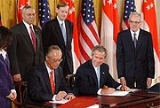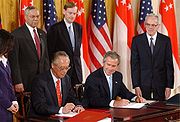
US-Singapore Free Trade Agreement
Encyclopedia
The United States
-Singapore
Free Trade Agreement was signed 6 May 2003 and ratified by the US House of Representatives on 24 July 2003 by a vote of 272-155. The US Senate ratified the bill on 31 July 2003 by a vote of 66-32.http://www.govtrack.us/congress/bill.xpd?bill=h108-2739 President George W. Bush
signed into law the United States-Singapore Free Trade Agreement Implementation Act on 3 September 2003. http://georgewbush-whitehouse.archives.gov/news/releases/2003/09/20030903-3.html The trade pact was implemented by both countries on 1 January 2004.
 In addition to lowering of tariffs, the agreement also allowed easier movement of citizens from both countries.
In addition to lowering of tariffs, the agreement also allowed easier movement of citizens from both countries.
It became possible for some Singaporean citizens the possibility of residing in the United States for extended periods of time. Business people and traders with E1 or E2 visa are allowed a two-year stay period but indefinite extension also allowed.
Professionals with H-1B1 visa are allowed to stay for a maximum period of up to 18 months but indefinite extension also allowed. There is an annual quota of 5,400 visa for Singaporeans, but this quota has yet to be reached to date. Any unused quota is transferred to the general pool for use by citizens of other countries.
United States citizens coming to Singapore are allowed to work in most business occupations for 3 months without a visa or Professional Visit Pass.
. A government enterprise was a "covered entity" for purposes of the FTA if the Government of Singapore owned any special voting shares, with the exception of enterprises operating only for investing Singapore Government reserves. Even if the Singapore Government did not own any shares in an enterprise, enterprises with revenue over an adjusted threshold could still be a covered entity if there was "effective influence" from the Government. Effective influence exists where the government owns more than 50% of the voting rights, or can exercise substantial influence over the management. If the government owns less than 50% of the voting shares, but more than 20%, there is a presumption of effective influence that the Government of Singapore can rebut.
Having broadly defined government enterprises, the chapter goes on to proscribe several obligations subject to the FTAs dispute settlement provisions. Singapore agreed to ensure that its government enterprises acted in accordance with commercial considerations and that they do not enter into anti-competitive dealings with competitors. Singapore also agreed to annually publish a report detailing its ownership and relationship with all covered entities, offer the names of any government officials serving as officers or directors, and the entity's annual revenue or total assets. Furthermore, Singapore is obligated to take no action or attempt at influcing decisions of its government enterprises, and at the same time continually reduce, with the goal of substantially eliminating, its ownership and other interests in enterprises.
columnist Jeffrey Robertson argued was a reward for Singapore's support of the Iraq invasion. The suggested quid pro quo may be dubious, since the FTA negotiations with Singapore were begun by President Clinton and concluded around the same time as the FTA with Chile (also started by Clinton), which was not a coalition partner.
United States
The United States of America is a federal constitutional republic comprising fifty states and a federal district...
-Singapore
Singapore
Singapore , officially the Republic of Singapore, is a Southeast Asian city-state off the southern tip of the Malay Peninsula, north of the equator. An island country made up of 63 islands, it is separated from Malaysia by the Straits of Johor to its north and from Indonesia's Riau Islands by the...
Free Trade Agreement was signed 6 May 2003 and ratified by the US House of Representatives on 24 July 2003 by a vote of 272-155. The US Senate ratified the bill on 31 July 2003 by a vote of 66-32.http://www.govtrack.us/congress/bill.xpd?bill=h108-2739 President George W. Bush
George W. Bush
George Walker Bush is an American politician who served as the 43rd President of the United States, from 2001 to 2009. Before that, he was the 46th Governor of Texas, having served from 1995 to 2000....
signed into law the United States-Singapore Free Trade Agreement Implementation Act on 3 September 2003. http://georgewbush-whitehouse.archives.gov/news/releases/2003/09/20030903-3.html The trade pact was implemented by both countries on 1 January 2004.

It became possible for some Singaporean citizens the possibility of residing in the United States for extended periods of time. Business people and traders with E1 or E2 visa are allowed a two-year stay period but indefinite extension also allowed.
Professionals with H-1B1 visa are allowed to stay for a maximum period of up to 18 months but indefinite extension also allowed. There is an annual quota of 5,400 visa for Singaporeans, but this quota has yet to be reached to date. Any unused quota is transferred to the general pool for use by citizens of other countries.
United States citizens coming to Singapore are allowed to work in most business occupations for 3 months without a visa or Professional Visit Pass.
Competition chapter
Chapter 12 of the agreement proscribes conduct to promote competitive market behavior. The chapter broke new ground among U.S. FTAs for its obligations related to government enterprisesGovernment-owned corporation
A government-owned corporation, state-owned company, state-owned entity, state enterprise, publicly owned corporation, government business enterprise, or parastatal is a legal entity created by a government to undertake commercial activities on behalf of an owner government...
. A government enterprise was a "covered entity" for purposes of the FTA if the Government of Singapore owned any special voting shares, with the exception of enterprises operating only for investing Singapore Government reserves. Even if the Singapore Government did not own any shares in an enterprise, enterprises with revenue over an adjusted threshold could still be a covered entity if there was "effective influence" from the Government. Effective influence exists where the government owns more than 50% of the voting rights, or can exercise substantial influence over the management. If the government owns less than 50% of the voting shares, but more than 20%, there is a presumption of effective influence that the Government of Singapore can rebut.
Having broadly defined government enterprises, the chapter goes on to proscribe several obligations subject to the FTAs dispute settlement provisions. Singapore agreed to ensure that its government enterprises acted in accordance with commercial considerations and that they do not enter into anti-competitive dealings with competitors. Singapore also agreed to annually publish a report detailing its ownership and relationship with all covered entities, offer the names of any government officials serving as officers or directors, and the entity's annual revenue or total assets. Furthermore, Singapore is obligated to take no action or attempt at influcing decisions of its government enterprises, and at the same time continually reduce, with the goal of substantially eliminating, its ownership and other interests in enterprises.
Views in favor of US-Singapore FTA
Proponents of the US-Singapore FTA claim that the reduction of trade barriers between the two countries will lead to a growth in exports.Views opposed to the US-Singapore FTA
In announcing the deal, President Bush hailed Singapore as "a strong partner in the war on terrorism and a member of the coalition on Iraq." Asia TimesAsia Times
Asia Times was a newspaper launched in Thailand by Thai tycoon Sondhi Limthongkul in 1995. The newspaper hired talent from around the world to produce a regional English-language newspaper....
columnist Jeffrey Robertson argued was a reward for Singapore's support of the Iraq invasion. The suggested quid pro quo may be dubious, since the FTA negotiations with Singapore were begun by President Clinton and concluded around the same time as the FTA with Chile (also started by Clinton), which was not a coalition partner.

